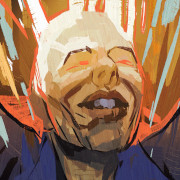sassassin posted:The shadowy tower was built by Numenorians and Gandalf's plan involves sticking one of them on a throne. yeah but I'm much smarter than Gandalf and I can clearly see Saruman is living in a big scary tower. sorry the guy reeks of bad news. Those Numenoreans were a dodgy bunch too. I've got my eye on that Elessar guy
|
|
|
|
|

|
| # ? Jun 13, 2024 01:42 |
|
Those hobbits are up to something.
|
|
|
Tree Bucket posted:Those hobbits are up to something.
|
|
|
|
|
perc2 posted:tell you what though if a fella like Saruman came up to me from his shadowy tower, with creepy & arrogant disposition i'd perceive his designs immediately, theres no way a guy like that isn't up to no good. Gandalf is a loving dumbass That kind of helps Saruman in that situation, though. Gandalf's used to Saruman looking down on him, it's SOP. Dude has his flash tower and looks down his nose at wizards who sleep under hedges, oh great he's a bit grumpier than usual today never mind OH poo poo. Ravenfood posted:That's a good question. Sauron's timing is predicated on the idea that Aragorn has the Ring and thinks to use it to challenge him. Yet he does not KNOW this in the same way that he immediately knows that Frodo claimed it. Aragorn doesn't claim it though. He shows himself to Sauron in the palantir and leaves Sauron to gnaw his fingernails about what he's got and how he plans to use it. Lemniscate Blue posted:I think there is a difference in power between the NazgŻl as the Black Riders who are searching for Baggins in the Shire and get punked by Frodo calling out "Elbereth"'s name at Weathertop and the NazgŻl after they get unhorsed and rebuilt. In Bree they basically have to work through agents like Bill Ferny, and they get chased out of Buckland by the Hobbits rallying to defend their own. It's really implied that their terror works best on lone and scared individuals at that point, and that camaraderie (singing and telling tales of heroics and tragedy) bolsters the spirit in a way that is actually effective against them. I see it more as an effect of environment - they're nearer to Mordor, everyone's been softened up by days of magical darkness, siege and fear - the Winged Nazgul are, essentially, terror running riot at that point. They're so much more powerful because so many more people are absolutely poo poo-themselves terrified and camaraderie isn't cutting it any more. What Shibawanko said, basically.
|
|
|
|
One thing that stood out on my recent read is how everybody talks about the Nazgul like they're a huge deal, and once the heroes find out that they're flying they completely flip out. Yet they don't actually do all that much. Feels a little bit like an unfired gun on the mantle. I guess with the main weapon being fear, making everyone flip out is the thing that they're doing to harm the heroes and advance the interests of Sauron.
|
|
|
|
Before the events of the story they lead the assault on Osgiliath successfully
|
|
|
|
The legends of the Witch King of Angmar would probably be pretty well known among the more knowledgeable races. I'd wager that even your average Gondorian has heard horror stories of the Nazgul that put an end to both lines of kings descended from Elendil.
|
|
|
|
The problem is we never see one get hurt except the group at the Bruinien, and then by Merry. While a big deal is made of them preferring secrecy and lurking in the shadows, at the end of the day they go toe to toe with Gandalf on weatherop, willingly charge an elf lord across the Bruinien, and then the witch king again goes toe to toe with Gandalf before getting stabbed in the back of the knee. While they may indeed prefer acting the way they did in Bree, to the reader that is the exception. What's clear is they can't see very well and this are poor trackers on their own, since the Ring seemingly gives a very large radius of where it might be. That makes stooges like Bill Ferny a requirement. I think Aragorn also mentions that they might just assault the inn if need be. The reason they don't is implied to be more about keeping Sauron's activities quiet than a lack of capability. Basically I feel like trying to create scenarios wherein the Nazgul are not fearsome opponents is kinda going down a rabbit hole. While being closer to Mordor certainly seems to amplify their capabilities, there is nothing to say they don't go hog wild for any reason other than Sauron not wanting a general alarm spread across the west of his growing power.
|
|
|
|
I've always wondered what Saruman thinks the Fellowship's plan is. He seems to have some idea that they're carrying the ring as he sends the Uruk-Hai after them. But I don't think he has even the slightest inkling that they're planning on trying to destroy it. His defiance of Gandalf after being defeated comes across as really tragic because Gandalf offers him a genuine clean slate and the West could desperately use Saruman's help but Saruman's disgust towards Gandalf makes sense when you think of it from his perspective. For all he knows Gandalf has the ring or is at least intending to deliver it to Aragorn or some other lord so that he can install them as lord of Middle Earth and rule through them. Gandalf's offer seems far less genuine if you're Saruman and you think Gandalf has the ring or is gifting it to Gondor.
|
|
|
|
Anshu posted:I'm not sure what the Silmarillion is supposed to be if not a literal account of events. You say Maglor is a mythical person, but if that's so, then Galadriel, Celeborn, and Cirdan must be equally mythical, with Elrond at least halfway as mythical, and all of them are very physical through the entirety of Third Age. Indeed, the running theme of the Third Age is that it is the last Age in which ancient myth and magic play an active role in the world; after its conclusion, all the remaining Elves and divine emissaries retreat across the sea to Valinor Ė analogous to going up Olympus in your metaphor Ė and become inaccessible to mortal men, or else remain and fade into imperceptibility. it's an elven source that recounts their own history up to and before their own coming into existence, it must be mythical i think you're supposed to read the silmarillion more like how ancient historians wrote about history, there are clear falsehoods and impossibilities mixed in with real events in the writings of most ancient historians, but this wasn't contradictory to them and the idea of literal, factual historical writing is relatively new. i think there's a sense that something like the voyage of earendil where he goes through the doors of night and becomes a star is less a literal, physical fact and more like a blending of events and myth. this works well with the idea that all of the stories are framed narratives, the lord of the rings is supposed to be a translation of a book written by a hobbit this idea appeals to me more because it goes against the sort of recent stuff about "worldbuilding" where you have a fully internally consistent world with a narrator-authority like in derivative fantasy and science fiction
|
|
|
|
another reason i like it is that it means that characters like gandalf act less on certainty and more on faith. i get a strong sense that gandalf, as a reincarnated physical being, is not exactly the same as the entity that was literally sitting next to god at the moment of creation (for example, he seems to experience doubt and fear). in all of the stories being more "real" and physical comes at the price of being disconnected from the immortal platonic world that the valar inhabit, which is why morgoth becomes weaker the stronger he tries to make his force felt in the real world this is also why the world needed humans. elves are cool but since they're immortal they inhabit a closed, half-mythical universe where they get to actually meet the gods and hang out with them and reincarnate when they die, a character like galadriel "remembers" the stuff from the silmarillion, but only in so far as she's not completely a real person and inhabits a bubble of elven reality in lorien (and when the ring is destroyed they start to "diminish", which i think means they fade along with the last of their supernatural bubbles of mythical reality), they were always supposed to just go to aman and stay there because interacting with the open, mortal world of humans results in failure and eternal regret. humans instead have to act on pure faith, not really knowing what happens to them when they die and making any risks taken in the physical world more significant to them, this is similar to the idea of the "good fall" from the bible where the fact that adam and eve being ejected from paradise was a necessary thing for the drama of human existence to really begin. the third age is the last period in which the mythical past and the historical past interact before the "dominion of man" which signifies modernity and rational time
|
|
|
|
Someone asked earlier what Saruman's plan was during the Scouring of the Shire. I think simple mayhem was his plan after Sauron fell and he was turned out of Isengard. "One ill turn deserves another". At that point he just wanted to do as much damage as he could before they inevitably got back to turn him out again.
|
|
|
|
Shibawanko posted:it's an elven source that recounts their own history up to and before their own coming into existence, it must be mythical I think I've identified part of the disconnect between us. You're committing an easily-made error by assuming that because The Lord of the Rings was published first, the later-published Silmarillion must be mere prequel or backstory, invented after the fact to expand on the world in which LotR takes place, when in actuality the opposite is true. The stories making up the Silmarillion were Tolkien's life's work long before The Lord of the Rings story was ever conceived; The Lord of the Rings is literally an after-thought. Anshu fucked around with this message at 18:31 on Jan 19, 2021 |
|
|
|
Imagined posted:Someone asked earlier what Saruman's plan was during the Scouring of the Shire. I think simple mayhem was his plan after Sauron fell and he was turned out of Isengard. "One ill turn deserves another". At that point he just wanted to do as much damage as he could before they inevitably got back to turn him out again. At the beginning I think Saruman was sincerely trying to make the Shire more "productive", possibly to feed his pipe-weed habit, but after his defeat he just wants to ruin the place out of spite, like running a huge polluting mill 24/7 even if there's no grain going into it. He says so right before Wormtongue kills him.
|
|
|
|
Anshu posted:I think I've identified part of the disconnect between us. You're committing an easily-made error by assuming that because The Lord of the Rings was published first, the later-published Silmarillion must be mere prequel or backstory, invented after the fact to expand on the world in which LotR takes place, when in actuality the opposite is true. The stories making up the Silmarillion were Tolkien's life's work long before The Lord of the Rings story was ever conceived; The Lord of the Rings is literally an after-thought. The Silmarillion as published should absolutely not be identified uncritically with the pre-LOTR texts that it was based on. The Lord of the Rings is an afterthought to The Hobbit, which was an afterthought to the Lost Tales and the Lay of Leithian. But while the Silmarillion also draws on these texts, the text as it exists was deliberately reconstructed to agree with the published LOTR.
|
|
|
|
That is true and absolutely worth keeping in mind; however, everything I've read and heard about how Christopher Tolkien approached that project says that he made as few alterations and additions as possible to what his father wrote, so I think that the main thrust of the work remains, as does the main thrust of my argument.
|
|
|
|
WoodrowSkillson posted:The problem is we never see one get hurt except the group at the Bruinien, and then by Merry. While a big deal is made of them preferring secrecy and lurking in the shadows, at the end of the day they go toe to toe with Gandalf on weatherop, willingly charge an elf lord across the Bruinien, and then the witch king again goes toe to toe with Gandalf before getting stabbed in the back of the knee. While they may indeed prefer acting the way they did in Bree, to the reader that is the exception. What's clear is they can't see very well and this are poor trackers on their own, since the Ring seemingly gives a very large radius of where it might be. That makes stooges like Bill Ferny a requirement. This ignores Weathertop. They have the hobbits there at their mercy, with only Aragorn to protect them. They know these hobbits have what they are seeking. They're in the wild, with no witnesses. There is no reason to let them go unless they are actually incapable of capturing or killing them. There is clearly some limit to their power here. Aragorn theorizes that it has to do with the fact that there were only five of them, and he's probably right. The Nine, all together, are far more terrifying and powerful. A couple of points as well. They don't charge Glorfindel, they are about to leave the river before it overwhelms them, but then they see Glorfindel and they flee him. Into the river. Where they are destroyed (temporarily of course). During the battle at Minas Tirith they mostly spread terror and attack fleeing opponents. Even Theoden is mostly undone by the knights of his house fleeing him, and then he is crushed under his own horse. There are two times when he shows uncertainty during the battle. The first, when he confronts Gandalf, who defies him. Importantly Gand7alf does not use any magic here, not really. His defiance is enough to send the Witch King packing. The second time is when Eowyn defies him and kills his mount. This isn't enough to send him packing, but if he was unnerved by her this would be the time to break out the big guns. But he doesn't. He just attacks her with his mace. It isn't her revelation that she is a woman that unnerved him. It was the fact that somehow she managed to defy him. I think the way to look at the Nazgul is this: They're empty. That emptiness is formless, and only can take form when shaped by someone else. So when they are feared, that fear gives form and power to their emptiness. But if they are defied, they lose all that. So if the Witch King is in his tower, surrounded by his terrified minions who believe him to be a powerful sorcerer, he is a powerful sorcerer. If he is leading an army, he is a powerful general. When Eowyn defies him, she's still scared of him. So he is still a fearsome warrior. But because she has defied him, that is all he is. There is a limit to her fear, so there is a limit to his power. Similarly, when spying in the Shire and Bree, the Nazgul are only ever able to be that nameless thing in the night. There is no expectation of what the Nazgul could be, so their power is limited. And this actually explains a question I had earlier. I had wondered why Gildor hadn't given Frodo a clearer warning. And this could be the reason. If Frodo expected the ringwraiths to be something, they would have used his fear to become that. Which means that Gildor was absolutely correct to not give Frodo something to fixate on.
|
|
|
|
sweet geek swag posted:And this actually explains a question I had earlier. I had wondered why Gildor hadn't given Frodo a clearer warning. And this could be the reason. If Frodo expected the ringwraiths to be something, they would have used his fear to become that. Which means that Gildor was absolutely correct to not give Frodo something to fixate on. That works really well.
|
|
|
|
sweet geek swag posted:This ignores Weathertop. They have the hobbits there at their mercy, with only Aragorn to protect them. They know these hobbits have what they are seeking. They're in the wild, with no witnesses. There is no reason to let them go unless they are actually incapable of capturing or killing them. There is clearly some limit to their power here. Aragorn theorizes that it has to do with the fact that there were only five of them, and he's probably right. The Nine, all together, are far more terrifying and powerful. I love this. Nothing in the text is nearly so explicit but it fits and really enriches it for me. Only good theory so far lmao.
|
|
|
|
Anshu posted:That is true and absolutely worth keeping in mind; however, everything I've read and heard about how Christopher Tolkien approached that project says that he made as few alterations and additions as possible to what his father wrote, so I think that the main thrust of the work remains, as does the main thrust of my argument. My point is not that Christopher made up a bunch of stuff and therefore none of it is true, itís that he welded together into one narrative (intended to be consistent with LOTR) what had originally been a number of variously developed and incomplete narratives, some of which agree with LOTR (or one another) and some of which extremely donít. Yes, JRRT wrote almost all of the Silmarillion text, but he didnít write it as it appears, and he certainly didnít arrange it. So in general I would be cautious of setting too much store by the literal truth of everything in the Silmarillion. The text is full of abstractions and epitomes and often even acknowledges it, repeatedly appealing to (then unpublished) received wisdom with set phrases like ďit is saidĒ. Again, itís not that the book is all lies, but even beneath the actual real-world arrangement and editing of the book, Tolkien as usual wanted to think about where texts are coming from, what points of view they are expressing, who is speaking through them, as much as he wanted to think about the literal truth of the events they describe. What does it mean that the planet Venus is a man in a boat with a jewel? It means thatís the way elves look at the universe. skasion fucked around with this message at 20:06 on Jan 19, 2021 |
|
|
|
sweet geek swag posted:This ignores Weathertop. They have the hobbits there at their mercy, with only Aragorn to protect them. They know these hobbits have what they are seeking. They're in the wild, with no witnesses. There is no reason to let them go unless they are actually incapable of capturing or killing them. There is clearly some limit to their power here. Aragorn theorizes that it has to do with the fact that there were only five of them, and he's probably right. The Nine, all together, are far more terrifying and powerful. That might be part of it, but they also stab Frodo. They withdraw because there is no need to risk themselves or take the Hobbits by force. The wound that the Witchking inflicted on Frodo will do that for them. What they didn't anticipate was just how incredibly tough Frodo was. I believe Elrond later notes that a powerful warrior might have been undone in short order by the wound that the Witchking gave Frodo, but Frodo persisted for a while with it. If that wound had overcome him he would have gone directly to the Ring Wraiths without them having to do anything to him at all. He'd their thrall. sweet geek swag posted:A couple of points as well. They don't charge Glorfindel, they are about to leave the river before it overwhelms them, but then they see Glorfindel and they flee him. Into the river. Where they are destroyed (temporarily of course). During the battle at Minas Tirith they mostly spread terror and attack fleeing opponents. Even Theoden is mostly undone by the knights of his house fleeing him, and then he is crushed under his own horse. If I'm not mistaken the fight at the ford happens during the day against an ancient elven lord who is pissed off is a tough foe for the nine to deal with in the full light of day where their power and terror are less. Aragorn is there also, and he's no slouch either. sweet geek swag posted:There are two times when he shows uncertainty during the battle. The first, when he confronts Gandalf, who defies him. Importantly Gandalf does not use any magic here, not really. His defiance is enough to send the Witch King packing. The second time is when Eowyn defies him and kills his mount. This isn't enough to send him packing, but if he was unnerved by her this would be the time to break out the big guns. But he doesn't. He just attacks her with his mace. It isn't her revelation that she is a woman that unnerved him. It was the fact that somehow she managed to defy him. Gandalf's defiance doesn't send him packing. The horn of Rohan does. Though I do think it would have been unlikely in any case that he would have tried to throw down with Gandalf there. He's not going to risk himself when he can just let his army do the conquering for him. He only directly risks himself against Theoden because the charge of Rohan has thrown his siege into disarray and he's actually in danger of losing if he doesn't personally take to the field and rout the enemy. Eowyn's defiance definitely unnerves him though. The Nazgul are used to being feared and it's definitely their most potent power. sweet geek swag posted:I think the way to look at the Nazgul is this: They're empty. That emptiness is formless, and only can take form when shaped by someone else. So when they are feared, that fear gives form and power to their emptiness. But if they are defied, they lose all that. So if the Witch King is in his tower, surrounded by his terrified minions who believe him to be a powerful sorcerer, he is a powerful sorcerer. If he is leading an army, he is a powerful general. I think you're half right. The most devastating part about them is that the terror they project. They're noticeably less effective during the day in part because they're less terrifying and in part because their senses are diminished during the day. But I don't think they're necessarily just empty vessels. The Witch King is reputed to be a deadly sorcerer and during the actual siege he seems to cast some sort of spell on the gate of Minas Tirith which helps the ram break through. He also holds up his hand and basically causes Frodo to be stricken dumb during the ford of Bruinen skirmish. That latter part might be attributed in part to Frodo becoming more subject to their will thanks to his vulnerability from being stabbed by the Morgul Blade. Speaking of magic...the Morgul Blades themselves seem magical in nature. Being able to turn someone into a wraith is a pretty devastating power. Did Sauron craft those blades, or did the Witch King prepare them? I guess that latter part is up for debate. Also I think it's implied - or outright stated - somewhere in the book that Nine aren't anywhere near as terrible or deadly as they would be with Sauron possessing the ring. All that is to say I think you're right in that their primary power is causing fear and terror and if one is capable of resisting that part of them they're much less scary but they're capable and dangerous beyond that and only a few in Middle Earth would have the strength to resist them. Ginette Reno fucked around with this message at 20:30 on Jan 19, 2021 |
|
|
|
sweet geek swag posted:This ignores Weathertop. They have the hobbits there at their mercy, with only Aragorn to protect them. They know these hobbits have what they are seeking. They're in the wild, with no witnesses. There is no reason to let them go unless they are actually incapable of capturing or killing them. There is clearly some limit to their power here. Aragorn theorizes that it has to do with the fact that there were only five of them, and he's probably right. The Nine, all together, are far more terrifying and powerful. This seems mostly internally consistent but what it leaves out is the very first encounter between the Hobbits and the Nazgul, where they just encounter a Black Rider and they have no idea who or what this person is, but it's still threatening - would you say that's the hobbits just interpreting the "black robes black horse = scary" bit?
|
|
|
CommonShore posted:This seems mostly internally consistent but what it leaves out is the very first encounter between the Hobbits and the Nazgul, where they just encounter a Black Rider and they have no idea who or what this person is, but it's still threatening - would you say that's the hobbits just interpreting the "black robes black horse = scary" bit?
|
|
|
|
|
In conclusion, wraiths are scary ghosts that will kill you but also super dumb and if you dug a hole they'd probably fall into it
|
|
|
|
skasion posted:What does it mean that the planet Venus is a man in a boat with a jewel? It means thatís the way elves look at the universe. This smacks of Tolkien's late life effort to reconcile his stories with the scientific fact of the universe (such as the world always having been round, the sun always having been the source of the world's light, and Venus always having been visible in the sky). Despite being an impulse I understand very well, I am glad he never succeeded in finishing that effort, because it would have lessened his work. If you are approaching the text from that perspective, then I'm not sure there's any profit in us continuing to discuss this.
|
|
|
|
Anshu posted:I think I've identified part of the disconnect between us. You're committing an easily-made error by assuming that because The Lord of the Rings was published first, the later-published Silmarillion must be mere prequel or backstory, invented after the fact to expand on the world in which LotR takes place, when in actuality the opposite is true. The stories making up the Silmarillion were Tolkien's life's work long before The Lord of the Rings story was ever conceived; The Lord of the Rings is literally an after-thought. no i obviously know all of that, i also don't really see why it would matter? i'm not talking about the sequence in which the books were written, i'm talking about how to best read them
|
|
|
|
Lotr contains a lot of silmarilion stuff anyway. Earendil is in there. Beren and Luthien. Iím sure we could think of more.
|
|
|
|
CommonShore posted:This seems mostly internally consistent but what it leaves out is the very first encounter between the Hobbits and the Nazgul, where they just encounter a Black Rider and they have no idea who or what this person is, but it's still threatening - would you say that's the hobbits just interpreting the "black robes black horse = scary" bit? Ah, but that isn't the first encounter between the hobbits and the Nazgul. The first encounter is in Bagshot Row, where Frodo hears the Nazgul asking after him, and Sam then talks to the Gaffer. So when Frodo meets the Nazgul on the road, he knows somebody is following him, probably with ill purpose. And he shared this knowledge with Sam and Pippin. That's enough to create a fair amount of trepidation, even if he doesn't specifically fear anything particular.
|
|
|
|
Shibawanko posted:no i obviously know all of that, i also don't really see why it would matter? i'm not talking about the sequence in which the books were written, i'm talking about how to best read them My point was that the events of the Silmarillion were meant to be read as honest descriptions of real events, not as a series of just-so stories.
|
|
|
|
Ginette Reno posted:That might be part of it, but they also stab Frodo. They withdraw because there is no need to risk themselves or take the Hobbits by force. The wound that the Witchking inflicted on Frodo will do that for them. What they didn't anticipate was just how incredibly tough Frodo was. I believe Elrond later notes that a powerful warrior might have been undone in short order by the wound that the Witchking gave Frodo, but Frodo persisted for a while with it. If that wound had overcome him he would have gone directly to the Ring Wraiths without them having to do anything to him at all. He'd their thrall. So certainly all this is true, but there is one reason that this is an insane risk to take. Aragorn is there. They must realize that he is a Ranger and a Dunadan. He might realise what is happening to Frodo, kill him, and take the Ring. Aragorn with the Ring is a far more dangerous opponent than Frodo. I have to believe that they would have carried away Frodo if there was any way they could have accomplished it. Ginette Reno posted:If I'm not mistaken the fight at the ford happens during the day against an ancient elven lord who is pissed off is a tough foe for the nine to deal with in the full light of day where their power and terror are less. Aragorn is there also, and he's no slouch either. All true, but I was just responding to the idea that they charged an elf Lord, which was the opposite of what happened. I would actually argue that Glorfindel or Gandalf, were they inclined to be scared of the Nazgul, would actually be more vulnerable to the Nazgul. I think this would also explain why they only had a few people who could go out against the Nine; they had to be powerful enough to be dangerous as well as wise enough not to fear them. I would further argue that even Glorfindel probably couldn't destroy an Nazgul, but he probably has some means of capturing, containing or injuring them, for a time at least. A Hobbit might rip one's cloak off or something, which might make them formless or something, but wouldn't do anything worse. Ginette Reno posted:Gandalf's defiance doesn't send him packing. The horn of Rohan does. Though I do think it would have been unlikely in any case that he would have tried to throw down with Gandalf there. He's not going to risk himself when he can just let his army do the conquering for him. He only directly risks himself against Theoden because the charge of Rohan has thrown his siege into disarray and he's actually in danger of losing if he doesn't personally take to the field and rout the enemy. I agree with everything you say here. I do think the Witch King perceives that there is a connection between Gandalf's defiance and the arrival of the Rohorrim though. But I would argue that the Witch King not wanting to get involved in the fighting unless he has to is not particularly damning for my "The Nazgul don't have any intrinsic power of their own," theory. Ginette Reno posted:I think you're half right. The most devastating part about them is that the terror they project. They're noticeably less effective during the day in part because they're less terrifying and in part because their senses are diminished during the day. But I don't think they're necessarily just empty vessels. The Witch King is reputed to be a deadly sorcerer and during the actual siege he seems to cast some sort of spell on the gate of Minas Tirith which helps the ram break through. He also holds up his hand and basically causes Frodo to be stricken dumb during the ford of Bruinen skirmish. That latter part might be attributed in part to Frodo becoming more subject to their will thanks to his vulnerability from being stabbed by the Morgul Blade. Speaking of magic...the Morgul Blades themselves seem magical in nature. Being able to turn someone into a wraith is a pretty devastating power. Did Sauron craft those blades, or did the Witch King prepare them? I guess that latter part is up for debate. The Witch King is a powerful sorcerer. At least he is when he is surrounded by armies of his own soldiers who are probably as or more terrified of him than any of his enemies. And I agree that if Sauron had the One they would be far more powerful, or rather, (and this just a guess so take it with a huge grain of salt) that Sauron would be able to directly manipulate the form they take rather than be forced to use the fear of others to give them form. This is a real fun rabbit hole to go down, because honestly it makes the Nazgul in some ways more terrifying.
|
|
|
|
Anshu posted:My point was that the events of the Silmarillion were meant to be read as honest descriptions of real events, not as a series of just-so stories. Parts of it happen before the sun and moon so maybe not so much
|
|
|
|
euphronius posted:Parts of it happen before the sun and moon so maybe not so much Parts of it happen before the sun and moon, but also, people who were there before the sun and moon are still around to check "yo this is actually what happened" with.
|
|
|
|
They werenít actually thatís absurd.
|
|
|
|
Anshu posted:My point was that the events of the Silmarillion were meant to be read as honest descriptions of real events, not as a series of just-so stories. I had actually typed up a response along these lines earlier, even using the term "just-so stories"! Basically: reignonyourparade posted:Parts of it happen before the sun and moon, but also, people who were there before the sun and moon are still around to check "yo this is actually what happened" with. "Venus = a guy in a boat with a jewel" isn't just some kooky idea the Elves came up to explain that extra-bright star. Galadriel was there hanging with the gods when her uncle made the jewel in question. Earendil's son is over in Rivendell if you want to know more.
|
|
|
|
Isn't it like Tolkien writes a bunch of stories that sound like just-so myths from a fallen age looking back to a heroic one. Then he writes some novels with these stories are in the background - including bringing some immortal characters from the myths into the novel. He could have done it as "the people in this world believe Venus is a guy on a boat", except then he made that guy's son a character in the book. Now he has the problem of reconciling his myths that the sun and moon are spirits caught in an eternal dance of unrequited love with his novel that carefully mapped out real-world phases of the moon based on real astronomy, and he never quite finished it to his satisfaction in his lifetime.
|
|
|
CommonShore posted:This seems mostly internally consistent but what it leaves out is the very first encounter between the Hobbits and the Nazgul, where they just encounter a Black Rider and they have no idea who or what this person is, but it's still threatening - would you say that's the hobbits just interpreting the "black robes black horse = scary" bit? I feel this in consistent with sweet geek swag's excellent reading of the Nazgul, the Hobbits are very suspect of the Rangers who unbenkownst to them, watch over their lands, so it makes sense that the Black Riders are manifest as their suspicion of these strange Men, but even more so - riding through on steeds with haste, shadowy and wreathed in cloak, indiscernible features, aggressive tounge, incredibly suspect. The Nazgul are far from the succor of Mordor and are in a land that is looked over by the most incorruptible of Men and possibly greater powers - so they take the shape of what is basically an even more sus version of the queer Rangers the Hobbits talk about in pubs. In short they present themselves as avatars of the parochial suspicion Hobbits have of the Big Folk, and that's really all they can do so far from home, especially if we grant their terror is generated from the particular minds of their quarry perc2 fucked around with this message at 01:08 on Jan 20, 2021 |
|
|
|
|
sweet geek swag posted:The Witch King is a powerful sorcerer. At least he is when he is surrounded by armies of his own soldiers who are probably as or more terrified of him than any of his enemies. And I agree that if Sauron had the One they would be far more powerful, or rather, (and this just a guess so take it with a huge grain of salt) that Sauron would be able to directly manipulate the form they take rather than be forced to use the fear of others to give them form. I love how murky it is. My favorite part about LOTR is the mystery of the books. We don't know how deadly the Nazgul or Sauron really are. A lot of that is left to the imagination. It's way more fun that way. Tolkien gives the reader just enough to ignite their imagination.
|
|
|
|
euphronius posted:They werenít actually thatís absurd. Pham Nuwen posted:"Venus = a guy in a boat with a jewel" isn't just some kooky idea the Elves came up to explain that extra-bright star. Galadriel was there hanging with the gods when her uncle made the jewel in question. Earendil's son is over in Rivendell if you want to know more.
|
|
|
perc2 posted:I feel this in consistent with sweet geek swag's excellent reading of the Nazgul, the Hobbits are very suspect of the Rangers who unbenkownst to them, watch over their lands, so it makes sense that the Black Riders are manifest as their suspicion of these strange Men, but even more so - riding through on steeds with haste, shadowy and wreathed in cloak, indiscernible features, aggressive tounge, incredibly suspect. The Nazgul are far from the succor of Mordor and are in a land that is looked over by the most incorruptible of Men and possibly greater powers - so they take the shape of what is basically an even more sus version of the queer Rangers the Hobbits talk about in pubs. In short they present themselves as avatars of the parochial suspicion Hobbits have of the Big Folk, and that's really all they can do so far from home, especially if we grant their terror is generated from the particular minds of their quarry But they aren't major limits, and the idea that there is some "actual" reality - entities who could carry real knives and if needful carry the Ring back to Mordor in an actual hand - beneath the huge shell of terror and fear makes total sense to me.
|
|
|
|
|

|
| # ? Jun 13, 2024 01:42 |
|
Oh, I'm definitely not dismissing them as being physical presences in the world. Indeed, after the flood, one of the steeds was not found and so it is implied that one of the Nazgul, presumably the Witch King, rode with haste to Mordor in defeat (or as we discussed some time ago, all of them were ponied up on a single horse because they're best buds). I mean to say that their manifestation in the physical is contingent on their time and place in the world and the minds of the people they assail (again if we follow the aforementioned interpretation). They're very much there, but their influence and stature is subject to conditions. They can't reveal themselves in full terrible might because that would a) Attract the powers overseeing the Shire and reveal Sauron's hand b) Sauron's influence and thus their very power falls off over distance c) The nature of the mission d) etc etc The point is that Sauron deals in manipulation and shadow. He fashions the Riders in a form that can manipulate the people of The Shire by playing into their fears - twisted versions Big Folk and the Rangers (which is all they know). By manipulating them, they reveal the location of the Baggginnsss with little effort or violence so his designs stay occluded and he gets the result he wants. Only later when the whole of Middle Earth is united against him after several victories does he decide "well, gently caress it" and unleashes the full extent of his wrath. perc2 fucked around with this message at 01:50 on Jan 20, 2021 |
|
|
|



































